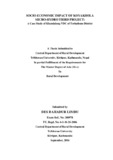Please use this identifier to cite or link to this item:
https://elibrary.tucl.edu.np/handle/123456789/2285| Title: | Socio-Economic Impact of Koyakhola Micro-Hydro Third Project |
| Other Titles: | A Case Study of Khamlalung VDC of Terhathum District |
| Authors: | LIMBU, DES BAHADUR |
| Keywords: | Socio-economic Status;Electric Power consumption;Hydropower |
| Issue Date: | Sep-2016 |
| Publisher: | Central Department of Rural Development Tribhuvan University Kirtipur, Kathmandu |
| Abstract: | The present study entitled "Socio-Economic Impact of Koyakhola Micro-Hydro Third Project" is an attempt to find out the socio-economic impacts of Micro-hydropower project in Rural Area of 2, 3, 4 and 7 wards of Khamlalung VDC of Terhathum district. This study especially reports to the evaluation of socio-economic impact and socially acceptance and economic viability of Koyakhola Micro-hydropower Third Project in Khamlalung VDC of Terhathum district. It encompasses many studies area of micro-hydropower. But it especially focuses on the investigation of such questions like who are the beneficiaries and to what extent do they get benefit. This study is focused on studying the constraints prevailed in rural energy of Nepal. It also keeps the interest to find out the answer of the questions who gets the access to the rural lighting and why? As electricity is regarded as a major infrastructure of development, every place should be facilitated with it. But majority parts of our country have to spend their life in darkness because of which they are facing so many problems related to their daily life situations. Such problems like not proper access to modern science and technology, education and other occupations in which they are involved. The main objective of the study is to evaluate the impact of the micro hydropower projects (MHPs) in rural development and socio-economic aspects through income, health and sanitation, education and information technology and suggest solution for sustainable development of MHPs. The study has employed both primary and secondary sources of data collection. Under the primary sources, the study has been based on questionnaire, interview and direct observation of the project site and affected areas. To meet the objectives of the research, 60 respondents of the study area i.e. Khamlalung VDC (ward no. 2, 3, 4 &7) of Terhathum district were selected as the primary sources of data. Likewise, different reports and official publications regarding hydropower plants have been taken into consideration for the statistical data. In order to conduct this research, procedure was used to select 60 respondents of Khamlalung VDC (ward no. 2, 3, 4 &7) of Terhathum district as a research methodology. A questionnaire was used as the tool for data collection and finding out the socio-economic impacts of micro-hydropower projects in Rural Area. In addition to it, direct observation and interview methods are 7 also adapted to collect information regarding knowing about socio-economic impact about MHP. The study found mixed socio-economic impact of the project on the project affected areas. About 80% of the respondents are seems to be satisfied with the MHP and about 20% of the respondents are seems to be dissatisfied with this MHP. The study further finds out that the population has not completely substituting electricity for firewood. In the study area 70% students' performance at school is improved after MHP installation because children have been studying at the night time using electricity. People are suffering from asthma, bronchitis, eyes infection and heart diseases due to indoor air pollution. Hydroelectricity has a prominent role in reduce indoor air pollution by decreasing the use of firewood and kerosene. Electricity from a micro hydro plant makes it possible to use overhead projectors, computers, TV, radio, refrigerator, chargeable battery, mobile and internet. This increases the living standard of the people in the study area. To sum up, installation of small hydropower projects like Siudigadh Micro-hydro Power Project is significant for several angles like, to fulfill national demand for electricity, project environment, uplift living standard of rural people. |
| URI: | http://elibrary.tucl.edu.np/handle/123456789/2285 |
| Appears in Collections: | Rural Development |
Items in DSpace are protected by copyright, with all rights reserved, unless otherwise indicated.

